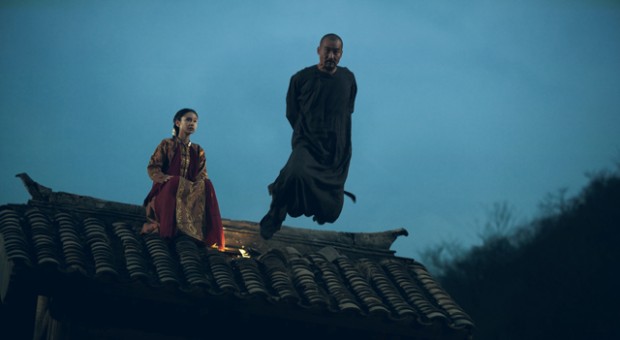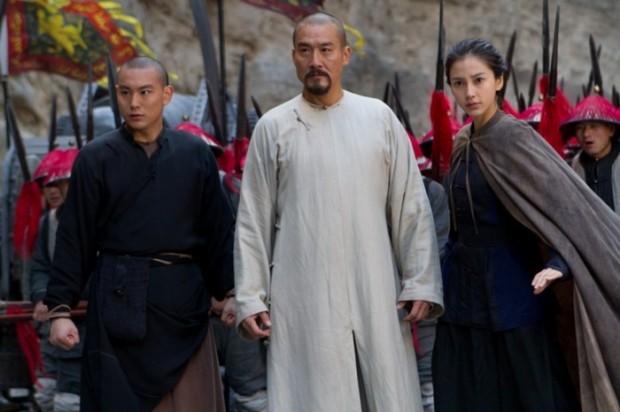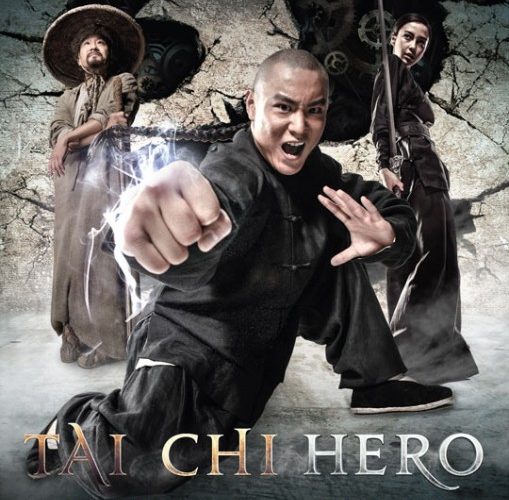Stephen Fung returns to the zany world of steam-punk martial arts fantasy he created in last year’s Tai Chi Zero, dropping some of the hyperactive pop references and upping the action ante along the way. If the original film felt like watching Kung-Fu Theater on cable while chugging a Red Bull and binging on Pixy Stix, then Tai Chi Hero’s first hour is the mellow sugar-rush aftermath, slowing down just enough to let us in on the story, which was rather scarce last go-round. The playful performances of the returning cast and some impressive battle scenes in the second half make this installment a reasonable improvement, even if it’s still unclear where all of this is headed for the third picture.
Fung wastes no time leaping into the story, and picks back up with Yang Lu Chan (Yuan Xiao Chao), the proclaimed ‘freak’ turned hero of Chen village, who is still feeling the consequences-both positive and negative—of using his Hulk-like rage abilities to topple Zi Jeng’s mechanical menace. Thanks to his mutant horn, Chan’s emotions are somewhat muted, leaving him a human Kung-Fu Panda who spends all day training and consuming leaves. Yu Niang (Angelababy) is technically his wife, but the tenacious daughter of the Grandmaster really only agreed to marriage to save Chan’s life from the town’s elders; they share a teacher and pupil relationship now, made clear by the fact he sleeps on the floor.

Into this moment of relative peace enters Niang’s older brother Zai Yang, who advises against Chan’s presence here and forewarns of the return of the fearsome Monk (Daniel Wu), who once forced Grandmaster Chen to swear an oath to never teach outsiders their kung-fu. Once more Chan is cut-off from the villagers and to add to the cartoon insanity, Zi Jeng has partnered with Duke Fleming (Peter Stormare) of the East India Trading company; together they plan to blow up Chen village so the railroad expansion can move forward. If you didn’t follow much of that, not to worry, the plot only really operates as a basic blueprint in Fung’s series, paving the way for the director’s own boundless energy and wacky inventions.
Unfortunately, most of Tai Chi Hero plays like a retooling of the original’s structure. Chan faces more challenges with the townspeople, similar conflicts with Angelababy’s Yu Niang, and must eventually prove himself again in battles that increase the scope and spectacle. The problem that plagued Fung’s first foray in this universe is similar here; it’s all style and precious little substance, and the former eventually drowns the latter. When the movie drops the video game subtitles, the fight schematics and the Scott Pilgrim-esque asides, it fares much better. Fung shows more interest in the mythology he’s built and although he enriches the motivations of Chen village and allows Chan to grow as the hero, there’s still a feeling that it’s all too little, too late to justify the three film structure he’s going for.

The character motivations are given stronger focus and bear more relevance this time, and the actors have more to chew on in terms of motivation and drama. Yuan, Angelababy and new arrival Feng Shao Feng have great chemistry together and throw themselves into the humor and the action with infectious joy, which makes the pulp serial format go down just a bit easier. Veterans like Patrick Tse and Tony Leung Ka Fai bring some weight to the proceedings, whilePeter Stormare looks as lost and out of place as he did in this year’s earlier genre upchuck Hansel and Gretel: Witch Hunters. Eddie Ping emerges again as the primary adversary, and he seems to be sharpening his teeth for the next round. Yuen Biao appears late in the game and reminds everyone why he’s such a celebrated performer, headlining the final fight that represents the last piece of Chan’s training.
This climactic fight scene with Yuen’s Master Li is the action lynchpin of the whole affair, a battle through a royal kitchen that trumps the absurd vegetable siege from Zero and so invigorates the film that it becomes the kind of giddy escapism it threatened to be all along. When Fung taps into his own inspirations and commits to his story, Hero soars, but he’s too obsessed with the post-modern gimmicks he’s grafted on top and keeps returning to these meaningless bits. If anything has wounded genre filmmaking in the past decade, it’s the concept of the pre-ordained franchise, encouraging artists to stretch their tale as far as it will go, telling a little and saving the rest for next time. I’m more than happy to watch a third Tai Chi concoction, but here’s hoping Fung has fully graduated from pupil to master before the return visit.
Tai Chi Hero is now in limited release.

